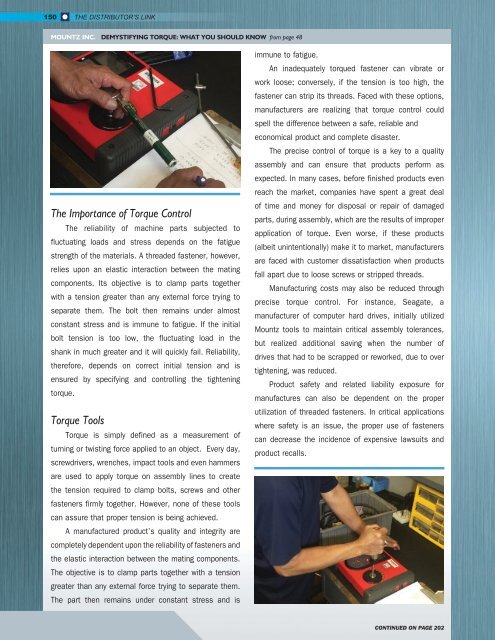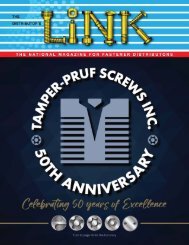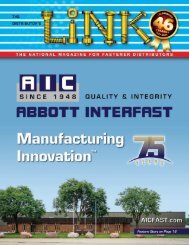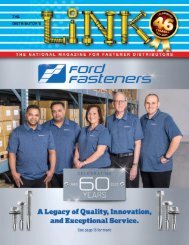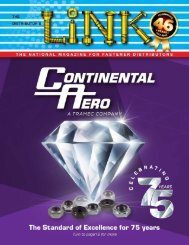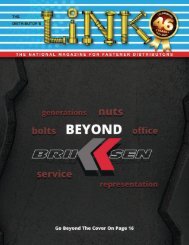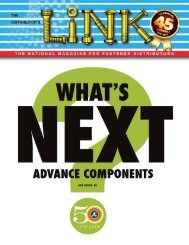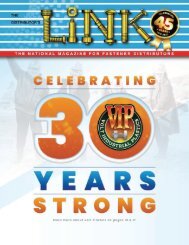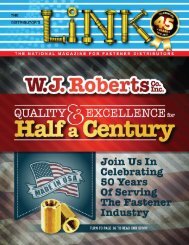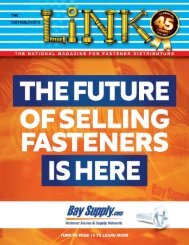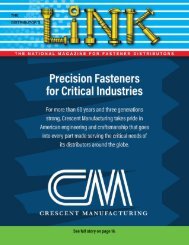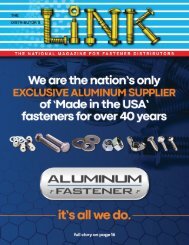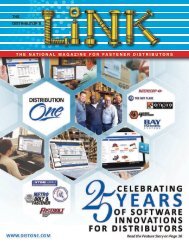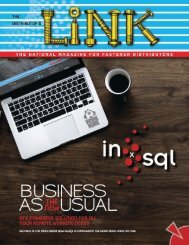FALL 2017
Distributor's Link Magazine Fall Issue 2017 / Vol 40 No4
Distributor's Link Magazine Fall Issue 2017 / Vol 40 No4
You also want an ePaper? Increase the reach of your titles
YUMPU automatically turns print PDFs into web optimized ePapers that Google loves.
150<br />
THE DISTRIBUTOR’S LINK<br />
MOUNTZ INC. DEMYSTIFYING TORQUE: WHAT YOU SHOULD KNOW from page 48<br />
The Importance of Torque Control<br />
The reliability of machine parts subjected to<br />
fluctuating loads and stress depends on the fatigue<br />
strength of the materials. A threaded fastener, however,<br />
relies upon an elastic interaction between the mating<br />
components. Its objective is to clamp parts together<br />
with a tension greater than any external force trying to<br />
separate them. The bolt then remains under almost<br />
constant stress and is immune to fatigue. If the initial<br />
bolt tension is too low, the fluctuating load in the<br />
shank in much greater and it will quickly fail. Reliability,<br />
therefore, depends on correct initial tension and is<br />
ensured by specifying and controlling the tightening<br />
torque.<br />
Torque Tools<br />
Torque is simply defined as a measurement of<br />
turning or twisting force applied to an object. Every day,<br />
screwdrivers, wrenches, impact tools and even hammers<br />
are used to apply torque on assembly lines to create<br />
the tension required to clamp bolts, screws and other<br />
fasteners firmly together. However, none of these tools<br />
can assure that proper tension is being achieved.<br />
A manufactured product’s quality and integrity are<br />
completely dependent upon the reliability of fasteners and<br />
the elastic interaction between the mating components.<br />
The objective is to clamp parts together with a tension<br />
greater than any external force trying to separate them.<br />
The part then remains under constant stress and is<br />
immune to fatigue.<br />
An inadequately torqued fastener can vibrate or<br />
work loose; conversely, if the tension is too high, the<br />
fastener can strip its threads. Faced with these options,<br />
manufacturers are realizing that torque control could<br />
spell the difference between a safe, reliable and<br />
economical product and complete disaster.<br />
The precise control of torque is a key to a quality<br />
assembly and can ensure that products perform as<br />
expected. In many cases, before finished products even<br />
reach the market, companies have spent a great deal<br />
of time and money for disposal or repair of damaged<br />
parts, during assembly, which are the results of improper<br />
application of torque. Even worse, if these products<br />
(albeit unintentionally) make it to market, manufacturers<br />
are faced with customer dissatisfaction when products<br />
fall apart due to loose screws or stripped threads.<br />
Manufacturing costs may also be reduced through<br />
precise torque control. For instance, Seagate, a<br />
manufacturer of computer hard drives, initially utilized<br />
Mountz tools to maintain critical assembly tolerances,<br />
but realized additional saving when the number of<br />
drives that had to be scrapped or reworked, due to over<br />
tightening, was reduced.<br />
Product safety and related liability exposure for<br />
manufactures can also be dependent on the proper<br />
utilization of threaded fasteners. In critical applications<br />
where safety is an issue, the proper use of fasteners<br />
can decrease the incidence of expensive lawsuits and<br />
product recalls.<br />
CONTINUED ON PAGE 202


